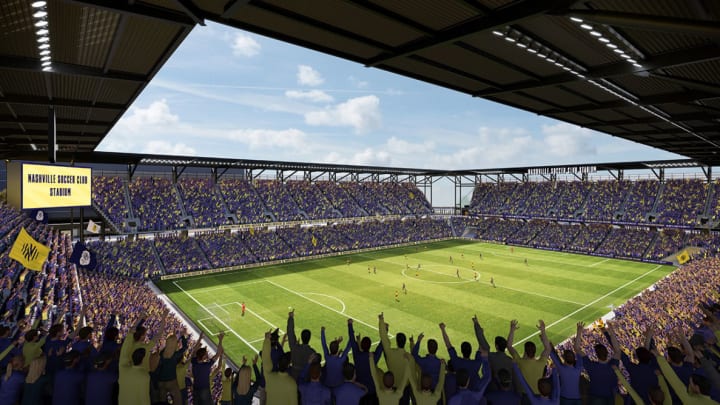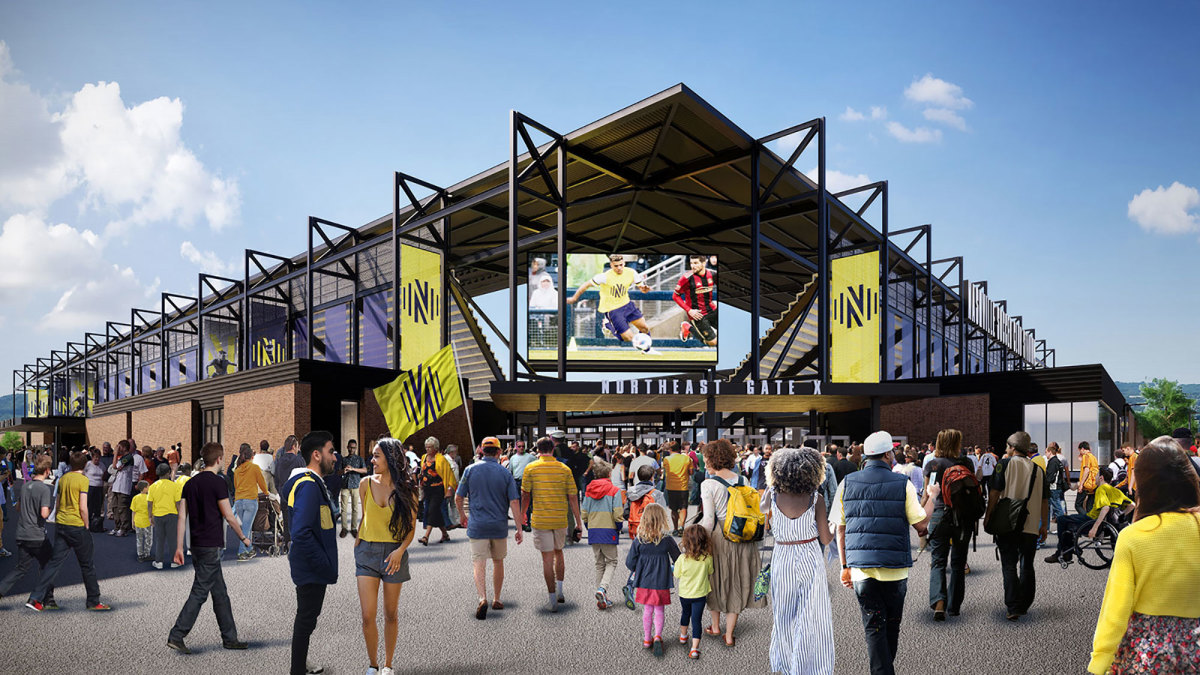Nashville SC, MLS's Legal and Political Battle Intensifies Over Stadium Dispute With Mayor

It’s been more than two years since Major League Soccer awarded an expansion franchise to Nashville. Tennessee’s capital city had its accelerated bid best a host of other cities that aspired to join the league, and an essential reason was Nashville’s pledge to financially collaborate with the team’s owners on building a new stadium. MLS made that much clear.
Nashville SC will begin play in MLS when the 2020 season starts later this month. But construction for the club's new stadium, which is slated to be built at the site of the Nashville Fairgrounds hasn’t even begun. Neither has the necessary demolishment of old Fairgrounds facilities, due to a political battle that is ramping up both in rhetoric and intensity. Nashville SC was always slated to play home matches at the Tennessee Titans' Nissan Stadium while it waited for its permanent home to be built, but how long that arrangement has to be in place now seems to be in dispute.
MLS isn’t happy about what seems like a political “bait-and-switch.” As an inducement to MLS to grant a franchise, Nashville promised and authorized the construction of a new stadium. Two years later, that stadium–let alone the bones for it–is nowhere to be found.
Even more discouraging for MLS, it’s now unclear when—or if—it will be built. Necessary demolition that was supposed to have occurred months ago no longer has a start date. Litigation over the stadium’s development and related political considerations further cloud the situation. Things have devolved to the point where the club is hosting an event Thursday night for its supporters, where MLS commission Don Garber will be part of a panel discussion regarding the stadium and its future.
Here's a closer look at the saga–and whether it could get to the extreme of MLS revisiting its placement of a franchise in the city.

A positive start didn’t last
Much has changed for Nashville SC since late 2016 and early 2017. Back then, MLS named Nashville as one of the cities under consideration for an expansion team. MLS was impressed by both the involvement of billionaire John Ingram, a Nashville resident and community leader, in the expansion effort and the enthusiastic pledge of the city’s mayor, Megan Barry, to build a stadium. Meanwhile, in July 2017, Garber expressed praise for Nashville after he watched 47,622 attend a Gold Cup match between the U.S. men's national team and Panama at Nissan Stadium.
Several months later, the city’s Metro Council approved by a decisive vote of 31-6 to offer bond funding for a stadium project that, at the time, carried a $275 million price tag. In December 2017, MLS approved an expansion team led by Ingram. Other investors in Nashville SC include the Wilf family, which owns the NFL's Minnesota Vikings.
The stadium at the Fairgrounds site was expected to open in 2022. That date could fall back further unless construction starts soon. The delay appears to reflect several factors.
First, the project will cost at least $50 million more than expected. Overruns tend to delay construction projects. However, owners of Nashville SC have pledged to pay for costs in excess of the original price tag. This suggests that an inflated price is a manageable problem and not one that should stop construction.
Second, concerned citizens and opposition groups, including Save Our Fairgrounds, have filed lawsuits in hopes of stopping the project. Among their legal arguments is that Nashville’s government improperly evaluated the stadium project and wrongly awarded contracts. As a result, the plaintiffs contend, the city violated both municipal ordinances and state statutes. In addition, demolition of the current site would allegedly interfere with city hosting rights awarded to flea markets and the Tennessee State Fair. A judge recently ruled that the litigation can continue toward a possible trial over the summer. Nashville SC has filed a motion to intervene in the litigation. The team has an obvious stake in the dispute and in receiving millions of dollars in subsidies promised by the city.
Third, and probably of greatest influence, Nashville has a new mayor, John Cooper, who voices both economic and logistical concerns about the stadium project that was agreed upon before his tenure began. Cooper assumed office last September, taking the place of David Briley, who had stepped in after Berry resigned over a year prior amid a scandal. Briley shared Berry's view of the MLS stadium project. Cooper does not, and to date, he has refused to authorize the necessary demolition.
Last month, Cooper issued a statement in which he stressed the “need to prioritize urgent investments in education, transportation, affordable housing, public safety, and neighborhood infrastructure.” He added that he “could not in good faith commit to using additional taxpayer dollars on a private entertainment subsidy.” Further, Cooper highlighted his apprehensions about the location of the project’s design and possible adverse impact on security, staging and access–while he simultaneously is trying to lure NASCAR to Nashville with the redevelopment of a speedway also at the Fairgrounds site.
In that same statement, Cooper attempted to reassure soccer fans by stressing the city’s “commitment to $225 million in revenue bonds for the stadium and $25 million of general obligation bonds for stadium-related infrastructure has not changed.” He also reported that Nashville SC has agreed to “absorb an additional $85 million in stadium cost overruns” and that the city would save an additional $54 million in other savings. In addition, he emphasized that remaining issues are narrowly limited to (1) “controlling costs” and (2) finding a design that address facility and location concerns. Cooper intimates that future discussions could lead to real solutions.
Cooper’s desire for more discussions with Nashville SC and MLS—and, by implication, more concessions from them—appears to be testing the patience of club ownership and league officials. They recently issued a joint statement reminding Cooper that MLS “would not have awarded Nashville an expansion team without the commitment by the city to build a soccer stadium at the Fairgrounds.” The statement goes on to criticize Cooper for his “continued refusal to proceed.” It adds that he has caused “deep disappointment” to both Nashville SC and MLS. On Monday–a day after Cooper penned an op-ed in The Tennessean titled "I want a stadium deal that works for everyone"–Nashville SC’s Twitter account urged fans to tell Cooper “that you’ve had enough” and sign a petition to build the stadium.

Where is the dispute headed?
The Nashville soccer stadium project has played out in the media, which means those involved have offered commentary geared in part toward shaping public opinion. This means commentary that is spirited and, at times, contentious. Behind the scenes, those involved are probably much less cantankerous and more inclined to resolve differences.
The most likely outcome is that, despite their rancor, Cooper and Nashville SC will strike a deal. Cooper has already gained significant financial concessions from Nashville SC; he might obtain additional ones related to the stadium’s design so that it better comports with Cooper’s wishes. Cooper, a Harvard-educated real estate developer and younger brother of Tennessee Congressman Jim Cooper, could then claim a decisive political victory. He would have saved Nashville taxpayers millions of dollars while transferring stadium costs to the club’s billionaire owners. At the same, he wouldn’t be blamed for losing a franchise of a major sports league. Cooper is undoubtedly aware that soccer matches have drawn well in Nashville. While playing in the USL, Nashville SC attracted higher attendance figures than most other USL franchises. Soccer fans and community leaders would likely pin the loss of a franchise on Cooper.
There might be secondary sports industry pressures on Cooper and city leaders to resolve their differences with Nashville SC and get the stadium built. Nashville, which hosts the NHL's Predators and Titans, is a plausible city for an expansion Major League Baseball team. If the city fumbles away an MLS franchise, that loss would be noticed by MLB and entertainment providers that have power over the placement of franchises, tournament and events.
At the same time, it would be difficult for Nashville SC or MLS to “force” Cooper to order the Fairgrounds facilities’ demolishment or take other municipal actions necessary for stadium construction. The team and league could petition a judge for an injunction that would compel Cooper to take these actions. They could emphasize that the city approved the stadium deal. Judges, however, are often unwilling to step into disputes that are fundamentally political controversies.
Here, Cooper asserts that before he green-lights a stadium project that has evolved over time, it is in his constituents’ interests to seek additional concessions from Nashville SC and MLS. While Cooper’s predecessor as mayor, Barry, was decidedly more amendable to the project, that viewpoint doesn’t automatically bind Cooper when executing the powers of his office. So long as Cooper’s decision-making with regard to the stadium project is reasonably justified under municipal, state and federal law, his decision-making is likely insulated from judicial rebuke.
If Cooper, Nashville SC and MLS can’t resolve their differences on new a stadium, MLS could explore the nuclear option: relocation of the franchise. Depending on the team’s lease agreement with Nissan Stadium (which is owned by the city and county government), the team could feasibly leave Nashville as early as the 2021 season. Relocation is probably the least likely outcome, though. Depending on its trajectory, relocation could spark a variety of legal fights between the main actors involved. There could be contractual disagreements between Nashville SC’s owners and MLS, as well as allegations of unlawful interference involving the city, Nashville SC and assorted businesses that have entered into contracts connected to the team. Season-ticket holders could also insist that they have been victimized by violations of consumer protection laws.
Chances are, Nashville SC will get its new stadium. If not, an attempt by MLS to unwind its decision to place a team in Nashville could be long and costly.
Michael McCann is SI’s Legal Analyst. He is also an attorney and the Director of the Sports and Entertainment Law Institute at the University of New Hampshire Franklin Pierce School of Law.
